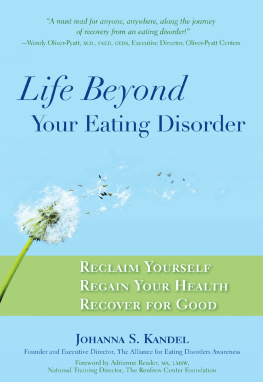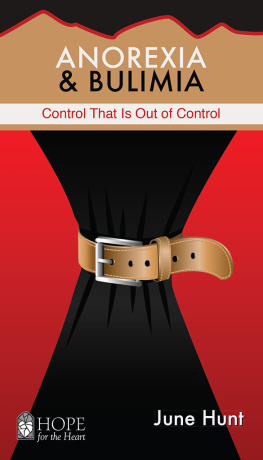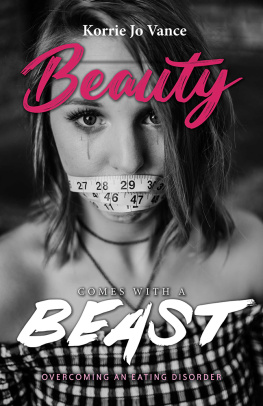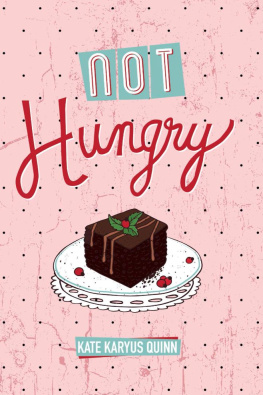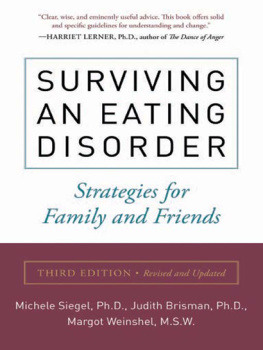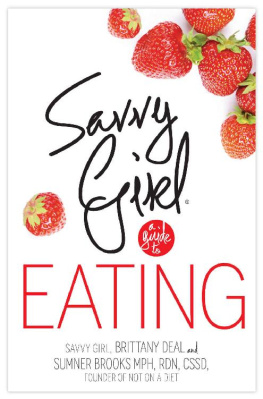First published in Australia in 2011 by
New Holland Publishers (Australia) Pty Ltd
eBook Edition: 2014
June Alexander Author/Publisher
Copyright 2011 June Alexander
All rights reserved. No part of this publication may be reproduced, stored in a retrieval system or transmitted, in any form or by any means, electronic, mechanical, photocopying, recording or otherwise, without the prior written permission of the publishers and copyright holders.
National Library of Australia Cataloging-in-Publication data: Alexander, June, 1950-A girl called Tim : escape from an eating disorder hell / June Alexander.
1st ed.
ISBN: 9781742984322 (eBook.)
Alexander, June, 1950- Anorexia nervosaPatientsAustraliaBiography. Anorexia in childrenPatientsCare.
362.1989285262
Digital edition distributed by
Port Campbell Press
www.portcampbellpress.com.au
Conversion by

To George and our children:
Shane, Rohan,Benjamin and Amanda
FOREWORD
I n 35 years of knowing June I have come to respect her writing talent and her ability to describe what has happened in her life. She recognises that mental illnesses existing in our community are frequently misunderstood, often misdiagnosed and therefore go untreated. I believe her story will benefit many sufferers of mental illness, together with their families and friends, and provide helpful insights for mental health professionals.
Each story, of course, is personal and this is Junes story. As all good clinicians know, it is important for people who are sufferingas a result of life events, which have had major influencesto discuss and deal with their distress. Overcoming anxiety, such as a real or perceived fear of rejection, can be liberating and uplifting.
At times in Junes journey, she candidly describes crossing the fine line between being well and unwell mentallythat is, losing all sense of self in an environment where awareness and acknowledgement of mental illness are minimal.
Her story illustrates the importance of early intervention when a child or adolescent develops a mental illness. In Junes case, anorexia nervosa. Apart from putting mental, emotional and physical health at risk, the illness can have a severe and long-term impact on relationships.
Psychotherapies, of which there are many kinds, are quite complex. They must be individualised. June appears to have benefited greatly from what has happened to her and has a clear understanding of what has been important to her wellbeing. Perceptions are not necessarily facts, but they are important in the way they influence the sufferer. Discussing things openly and trying to understand them with support is usually very helpful.
The role of psychotherapy and/or medication is at times controversial. Many people with mental illness, and their families, are reluctant to try the addition of pharmacological approaches, but in Junes case, it was of great benefit. She freely acknowledges that she needed medication. I recognise that many people are opposed to medication but it is a great aid to many, especially when anxiety levels become too high.
June has researched her subject thoroughly and has spoken to many sufferers, care givers, clinicians and academics. She has recognised that there are many women (usually) aged in their twenties, thirties, forties and beyond, whose lives are inhibited because childhood experiences have gone undetected, untreated or ignored. She is of the opinion that discussing such experiences with an appropriate therapist is beneficial and should be encouraged. Her story illustrates that a trusting relationship, no matter what is going on, is extremely important and that with the right guidance, support and care, quality of life can be enhanced at any age.
The same person cannot help us all and it is important for sufferers to persist until they find the right therapist. As June explains, she tried others before she found what she believed to be the right one, and wants others to take this approach. Do not give up. The hard work and perseverance brings rewards.
Readers will find inspiration in the pages to follow and I wish you well in continuing your own journey.
Graham D. Burrows, AO, KCSJ
BSc, MB, ChB, DPM, MD, DipMHlthSc(Clinical Hypnosis)
DSc, FRANZCP, FRCPsych, MRACMA, FAChAM
PROFESSOR OF PSYCHIATRY
President of the Mental Health Foundation of Australia
CONTENTS
Introduction
1. School Doctor Visit
2. My Illness Deepens
3. Patty Cake Breakthrough
4. Sweet Sixteen
5. On Exchange in Missouri
6. Engaged at 19, Married at 20
7. Log Truck Accident
8. Babies
9. Return to the Lindenow Valley
10. Losing My Sense of Self
photos
11. Seeking Help
12. Childhood Secret Rrevealed
13. Move to the City
14. Illness Isolates and Conquers
15. First Step to Restoration
16. Filling in the Gaps
17. Weddings, a Bird and Me
18. Soaring
Appendix A; An Eating Disorder in Your Family
Appendix B: Key Strategies
Epilogue
MY MANY MOVES AROUND
VICTORIA, AUSTRALIA

Forgiveness is the fragrance the violet sheds on the heel that has crushed it.
Mark Twain
INTRODUCTION
T his memoir is about a journey of more than 40 years with two eating disorders.
I was 11 years old, in Grade Six at primary school, when I developed a mental illness called anorexia nervosa. It starved my body and I became emaciated. Eventually I gained weight and everyone, including me, thought I was well again. But anorexia hid inside my brain, and continued to sabotage my mental and emotional health.
My memoir is written almost entirely from my diaries, which I began writing at the age of 12. The process of diary writing was important for, although not aware of this at the time, it helped me stay alive. Many years on, when I summoned the courage to read my journals, I was rewarded with a heightened understanding of self, of the influences and environment that shaped my childhood. This was liberating in moving forward with my present. For decades my life had seemed like a jigsaw puzzle there were pieces missing. I had gaping holes within. My diary contained clues to help heal and fill those gaps.
Isolated by my illness, my diary was frequently my only friend, my only link with a tiny thread of self. Often, tears soaked the page as I off-loaded loneliness, despair, alienation and rejection. Other times, my writing ran crookedly over the page, thoughts spilling haphazardly out of a mind numb from bingeing or heavily dosed with prescription drugs.
My love of the written word began when I was three. My earliest memory is of sitting cross-legged on the linoleum-covered kitchen floor, turning the pages of the daily newspaper and thinking: When I grow up I will read every word on every page. Even the tiny print in the Birth and Death columns. Words were fascinating. They were full of promise and possibilities. They could describe and express, reveal and reflect. Their shape, their look, big words, little words, the way they could mix and match to mean and convey different things was mesmerising. They were friendly. Above all, they were an escape from the outside world. They connected with me and when
Next page

